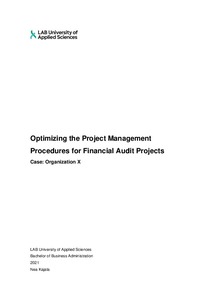Optimizing the project management procedures for financial audit projects : case: organization X
Kajala, Nea (2021)
Kajala, Nea
2021
All rights reserved. This publication is copyrighted. You may download, display and print it for Your own personal use. Commercial use is prohibited.
Julkaisun pysyvä osoite on
https://urn.fi/URN:NBN:fi:amk-2021091417748
https://urn.fi/URN:NBN:fi:amk-2021091417748
Tiivistelmä
The thesis focused on a specific department in Finland providing auxiliary audit assistance and administrative activities for Organization X. The SSC has recently expanded in terms of the number of audit engagements and the scope of the tasks. Therefore, there was a need for improved project management processes. The topic of the thesis was to study the fluency of the project management process in the financial audit projects. The objective of the thesis was to evaluate and suggest improvements to the audit project management procedures currently employed by the SSC.
The theoretical framework reviewed literature regarding financial auditing and project management. Thereafter the empirical context, data collection, and data analysis process were described. The data was collected by conducting semi-structured indepth interviews. The research data was analysed by thematic analysis.
The empirical findings identified the barriers slowing down the audit project management process. The key barriers concern information sharing, documentation, and transferring issues and team allocation challenges. Information management challenges affect the entire project management process and slow down the audit management process. Schedule and independence constraints create challenges in team allocation.
As a result of the thesis, the author developed a documentation tool to optimize the current project management process for audits employed by the SSC. The documentation tool improves the information flow thorough the project, allowing the project to be completed on time. A feedback loop was implemented within the development process to ensure that the documentation tool remains suitable and useful for the end-users. A provisional implementation plan for the documentation tool was included in the thesis. While the essence of the thesis is in a particular organization, the analysis and findings are of wider relevance.
The theoretical framework reviewed literature regarding financial auditing and project management. Thereafter the empirical context, data collection, and data analysis process were described. The data was collected by conducting semi-structured indepth interviews. The research data was analysed by thematic analysis.
The empirical findings identified the barriers slowing down the audit project management process. The key barriers concern information sharing, documentation, and transferring issues and team allocation challenges. Information management challenges affect the entire project management process and slow down the audit management process. Schedule and independence constraints create challenges in team allocation.
As a result of the thesis, the author developed a documentation tool to optimize the current project management process for audits employed by the SSC. The documentation tool improves the information flow thorough the project, allowing the project to be completed on time. A feedback loop was implemented within the development process to ensure that the documentation tool remains suitable and useful for the end-users. A provisional implementation plan for the documentation tool was included in the thesis. While the essence of the thesis is in a particular organization, the analysis and findings are of wider relevance.
